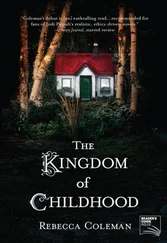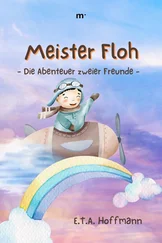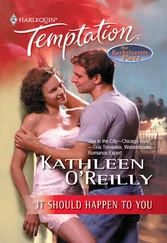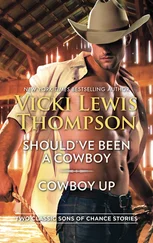I looked out over the jagged expanse of rock. It was a long way down. Cade left his sunglasses in the car, and as we approached the gaping, empty space, he stopped and peered up at the sky, squinting. High cirrus clouds marked the clear and solid blue, and the sunlight shone down through the trees as sharply as if thrown. He said, “I haven’t been back here since they drained it. It’s disorienting.”
“Sounds kind of like it was an old swimming hole, like in Tom Sawyer .”
“Yeah, and in the winter you could skate on it. We used to come out here all the time—winter, summer, anytime except when it was raining. Every year at Christmastime all the kids who’d gone away to school would have a reunion up here. Me and Elias and a lot of the other guys, we’d play hockey here once it was good and frozen. You see that spot?” He gestured toward the center of the empty space. “That was the no-go zone. It didn’t freeze hard enough over there, so if your puck went that way you were just screwed. One winter we lost so many pucks, we took to making them out of firewood dipped in beeswax just so they wouldn’t be worth anything. It didn’t work very well. We thought the beeswax would make them slicker, but it knocked off real fast once we started banging on them with the sticks.”
“So why’d they drain it?”
“Somebody drowned. One of the Vogels’ daughters from the next farm over. It was during the winter.”
I looked out over the canyon the rock formed, at all its precipitous ledges and sharp, loose boulders. Filled with water it must have been idyllic, but beneath the surface, dangerous as hell. “That’s awful.”
He kicked a few rocks over the edge. “Yeah. She was a friend of Candy’s. She’d been at one of the reunion games but nobody else knew her real well, so we were all just…talking to each other and not much to her, I guess. She must have been skating like everybody else, and at some point she went through the ice and nobody noticed. I didn’t hear anything about all that until later. Me and Elias had already left, so we missed the whole thing.”
“Candy must have been devastated.”
“She was in shock about it, I guess. Candy’s funny about stuff like that. It’s hard to say her faith comforts her. It’s more like she uses it to work out the logic of why everything happens. If something good happens she goes on about how it’s a reward for obedience or an answer to a prayer, and if things go wrong she says it’s a test of faith or a punishment. It’s almost like karma with her. I think it drives my mom nuts.” He sat down on a smooth stretch of rock. “This is the old sunbathing stone. In August, anytime you came here, there’d be a bunch of girls in their swimsuits stretched out here trying to get a tan.”
I moved to sit down beside him, and he reached for my arm to ease my way down. “I can’t stand it when people try to explain random tragedies. You wouldn’t believe how many people have said to me that small planes are dangerous and my mom never should have been in one in the first place. As if I’m going to say, ‘Oh, I feel much better about losing her now that you’ve explained why it was her own fault.’”
“Yeah, you and Candy are going to be the best of friends.”
I laughed and turned onto my back, resting my head in Cade’s lap. The sky was a more appealing sight than the jagged gap of the quarry; the high clouds moved through it slowly, their trailing edges thin as contrails. Cade stroked my hair back from my forehead in an idle way, and said, “I wish you could see this place the way it was before. I feel like there’s this part of me I can’t even show you because it doesn’t exist anymore.”
“It’s pretty much the same, though, right? It’s just the water that’s missing.”
“It’s just the people that’re missing,” he said.
I turned sideways so I could look out at what he was seeing: the ledges where his friends had once stood, the knotted yellow rope hanging from a tree, the scrubby and pebble-strewn grass that must have been the site of a hundred tailgate parties. I wondered if Elias missed it the same way. The Olmstead home seemed riddled with broken connections—to their extended family, to their way to gather as a community and even to each other, for the atmosphere of the house felt heavy with brooding thoughts that nobody talked about. It was no wonder Cade hated coming home. I had never imagined, in all my time growing up with just my mother, how hard it might be to live in a family. From the outside it had looked like the easiest and most natural thing.
Maybe it’ll be different after the baby gets here, I thought. The common work of caring for a newborn might bind the family together once again; a christening might even be an opportunity to reach out to Randy’s family and put a stop to the enmity from Dodge’s side. It might even give Elias a sense of renewal and purpose, and a distraction from all he had going on in his head. These are the thoughts I had, heady and optimistic, as Cade tried to make sense of the lost quarry lake. After all, my mother had never hesitated to share her burning testimony that it’s never too late to start over. My mother, however, was not an Olmstead. It was a lesson I would learn, again and again, in the months ahead.
Jill
The first blow came with the letter from the university, telling Cade that he had been cut from the work-study program due to a missed filing deadline. He started out bewildered, then grew angrier and angrier as he paced the back porch with his phone against his ear, pleading with the people in Financial Aid. I sat in the chair beside Elias and folded the freshly washed hand-me-down baby clothes slowly into a basket, lying low but listening in. At last he came in and slapped the phone down on the table in disgust.
“April 25,” he barked. “That was the deadline. You know what I had going on April 25?”
“I can’t remember.”
He jabbed the air with his index finger, gesturing toward my belly. “Junior there. School during the day, work in the afternoon, Stan’s in the evening, five hours of sleep. Bylina’s office any spare minute I got. You puking your guts out until they had to stick an IV in you. Like I’m supposed to remember financial aid paperwork in the middle of that. ”
“I don’t know what to tell you, Cade.”
“Nothing to tell me. We’re not going—I can’t—” He couldn’t bring himself to say it. He stopped in midpace and glared at the wall for a long moment, then kicked a box of Leela’s stars across the floor with the bottom of his boot. It skidded to the fireplace and hit the tools, knocking the poker to the floor with a clatter. “Goddamn it to hell.”
“Well, I guess you file again and hope for the spring.”
He ignored that. “All these months, since even before we left, I thought we were going back for the fall. They let me register and everything. And all this time, there’s been no hope.”
“That sucks, bro,” said Elias in a monotone. “I’d transfer you my GI Bill credit if I could, but they don’t let you.”
Cade set his hands on his hips and looked at the basket of clothes at my feet. “I’ll get a job down there, is what I’ll do. Just have to try harder. Because I am not fucking staying here. Not for thirty seconds longer than necessary.”
“Can’t blame you,” said Elias. But Cade was already heading out the back door, throwing it open so brusquely that the walls trembled. I rose from the chair, tugging my shirt down to cover my cumbersome belly, and made my way outside, taking my time to let him cool off a little. I found Cade leaning against the shed, smoking a cigarette and glaring into the middle distance. He didn’t so much as glance at me as I approached, yet once I had set my own back against the shed in a little gesture of solidarity, he started speaking.
Читать дальше












